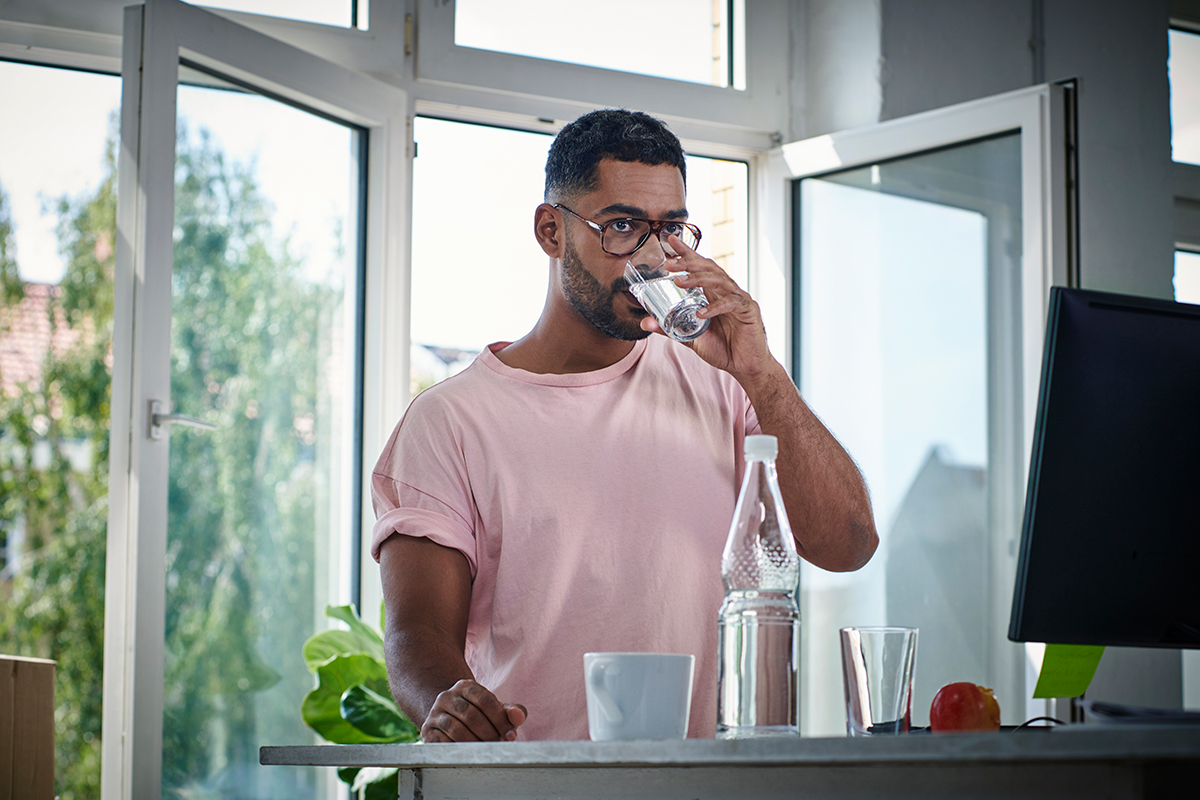Hydrate for your mental health
Our memory, energy and ability to concentrate can suffer when we're dehydrated. But recent research shows that our mental health also relies on adequate hydration levels

Research shows that drinking enough water can reduce the risk of depression and anxiety.
And even mild dehydration takes its toll on our health: losing just 1% of body mass, which might occur as part of everyday living, can lead to a dip in mood and anxiety.
The brain is 75% water
“Our brains depend on proper hydration to function optimally,” explains neuroscientist Dr Joshua Gowin.
“Brain cells require a delicate balance between water and various elements to operate and when you lose too much water, that balance is disrupted. Your brain cells lose efficiency.”
“The brain is about 75% water,” says dietician Jane Clarke. “So it’s easy to see why a lack of fluid could cause emotional processes to falter. It’s well known that hydration is the most important performance statistic for an athlete; likewise, your brain won’t perform at its best if it isn’t optimally hydrated.”
Dehydration can cause a dip in energy levels and impact how your body absorbs food, she adds, both of which can mean you end up feeling low.
“We know that dehydration affects gut function, and that there is a direct link between the gut and the brain. If you’re well hydrated, your body’s inflammation markers will be lower – which means you have a lower risk not only of chronic diseases but also of dementia and depression.”
Keep topping up
Before you rush out for a refill, it’s worth recognising the signs that mean you might be dehydrated.
Don’t rely on thirst as a ‘time to drink’ alarm – experts say that’s notoriously unreliable. Instead, check the colour of your urine: if it’s very dark, then you’re not drinking enough.
If your mouth is dry and sticky or you feel stressed or impatient, then you urgently need a drink, so get glugging. Remember, not everyone feels a sensation of thirst, says dietician Helen Bond.
“While most of us will feel thirsty if we’re dehydrated, sometimes people aren’t in tune with that.
And even if we do get thirsty, there are days for all of us when we are too stretched to think about getting a drink and, before you know it, you’ve had a long lapse since your last glass of water.
That’s going to affect hydration levels. The water content of our body is constantly under regulation, so it’s really important to make sure we are topping up fluid intake regularly.”
How much water should we drink?
So, how much should we be drinking to safeguard our mood, energy and focus? The European Food Safety Authority recommends 1.6 litres a day.
But your optimal level of water intake depends on many things: how hot it is outside; how tall you are; how much you’ve eaten; whether you’ve exercised, for instance.
And while our individual needs may fluctuate, Clarke says she recommends her clients drink 2.5 litres a day rather than the recommended 1.6 litres.
“We have to challenge the ‘adequate’ level of 1.6 litres. I know from my clinical experience of 30 years that if someone is taking in a good 2.5 litres of water, they generally feel at their best. Their likelihood of feeling low is much less.”
Clarke recommends drinking small amounts throughout the day rather than drinking pints towards bedtime.
“Give yourself a nudge by setting an alarm until you get into the habit of drinking a small glass every hour. And remember, H2O is H2O so it doesn’t matter whether you like sparkling or still. Just choose whatever you’re going to enjoy the most.” It’s time to drink up.
Recent articles

Feeling lonely? 4 ways to combat loneliness this season
For all the fun and frolics of the festive season, for many it can bring an equal amount of heartache. So, why not lift your - or someone else’s - spirits this time of year with these simple tips?

The way to avoid festive burnout? Just say ‘no’
For all of its fun, the festive period can be incredibly stressful too. Hoping to escape burnout this holiday season? Try saying ‘no’, writes Jennifer Wallis

What’s holding women back from getting active this winter?
Less than one in four women hit the recommended weekly exercise guidance – why? We asked women’s personal trainer and founder of LDN MUMS FITNESS, Sarah Campus

